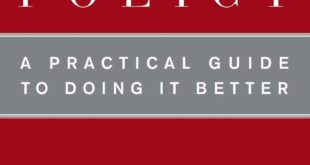How to become a Keynesian Until [2008], when the banking industry came crashing down and depression loomed for the first time in my lifetime, I had never thought to read The General Theory of Employment, Interest, and Money, despite my interest in economics … I had heard that it was a very difficult book and that the book had been refuted by Milton Friedman, though he admired Keynes’s earlier work on monetarism. I would not have been surprised by, or...
Read More »Mästarnas mästare har gått ur tiden
Mästarnas mästare har gått ur tiden En svensk fotbollslegendar har gått ur tiden. Zlatan i all ära, men för mig kommer alltid den här grabben att vara nummer ett. Bosse Larsson (1944-2023) spelade 16 säsonger i MFF. Han vann sex SM-guld och toppade skytteligan vid tre tillfällen. 1965 gjorde han 28 mål på 22 matcher. Bosse var — precis som yours truly — uppvuxen på Rosendalsvägen på Backarna i Malmö. Han sörjs av hela Malmö.
Read More »Evidence-based policy
‘Ideally controlled experiments’ tell us with certainty what causes what effects — but only given the right closures. Making appropriate extrapolations from (ideal, accidental, natural or quasi) experiments to different settings, populations or target systems, is not easy. ‘It works there’ is no evidence for ‘it will work here.’ Causes deduced in an experimental setting still have to show that they come with a transportability warrant to the target population. The causal...
Read More »Tendentiös statlig utredning tar storbankernas parti
Tendentiös statlig utredning tar storbankernas parti En orsakt till bankernas läge är framgångsrik lobbyism, vilket syns särskilt tydligt i betalningsutredningen som just nu behandlas av regeringen. Utredningens huvudfråga var: Ska staten ge ut kontanter och digitala e-kronor – eller ska svenska kronan bli utkonkurrerad av privata alternativ? När vi går igenom utredningen ser vi att den oförblommerat tar bankernas parti … När Riksbanken lanserade idén om...
Read More »Historiska vingslag i Lund (personal)
Historiska vingslag i Lund (personal) Idag när jag hjälpte vår yngsta dotter att efter nio år i Malmö flytta tillbaka till Lund fann jag till min förvåning att huset hon skulle flytta in i på Stora Magle Kyrkogata var gamla Historiska Institutionen. Huset som jag besökte ett otal gånger i mitten på 70-talet när jag läste tre betyg i historia har tydligen blivit omgjort till bostadshus. Jag har bara trevliga minnen därifrån — inte minst uppskattade lärare...
Read More »The greatest of them all
The greatest of them all .[embedded content] This live performance remains unequalled to this day. As Luciano Pavarotti once said: “Don´t compare me with Jussi Björling. I`m only human.”
Read More »Wokeism — a dogmatic, ‘guilt pride,’ civil religion
Wokeism — a dogmatic, ‘guilt pride,’ civil religion .[embedded content]
Read More »Modularity — a questionable assumption
Modularity — a questionable assumption Modularity is the mark of a type of independence from context. The same functional relationship between variables will hold in a given component of the contributing mechanisms whether or not there is a change in a different component. The total effect may change when different components contribute, but the operation of the modular mechanism will not be changed nor change them. In situations where the presence or...
Read More »The necessity of economic pluralism
The necessity of economic pluralism .[embedded content]
Read More »The Ricardian vice
The completeness of the Ricardian victory is something of a curiosity and a mystery. It must have been due to a complex of suitabilities in the doctrine to the environment into which it was projected. That it reached conclusions quite different from what the ordinary uninstructed person would expect, added, I suppose, to its intellectual prestige. That its teaching, translated into practice, was austere and often unpalatable, lent it virtue. That it was adapted to carry a vast...
Read More » Lars P. Syll
Lars P. Syll






